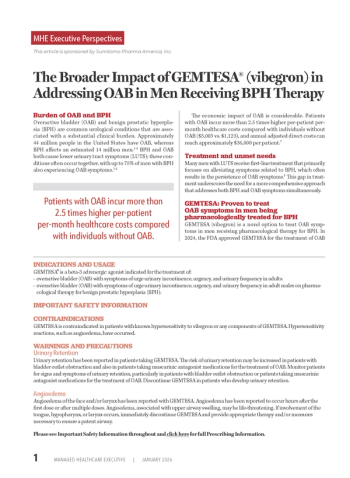
Empowering Consumer Choice with ePrescribing
Medication adherence significantly improves patient outcomes, but it is compromised when access to essential information about prescription drugs and associated out-of-pocket (OOP) costs is limited. Despite technical advancements allowing consumers to compare costs on everyday items via computers or smartphones, accessing prescription drug pricing information remains elusive to patients, often ending in sticker shock at pharmacies or worse, prescription abandonment.
The healthcare industry must provide patients with readily available pricing and understandable information in an easy-to-access, meaningful, and convenient way that encourages informed decision making and healthy behaviors.
Current Challenges
Significant obstacles remain in accessing essential information about prescription drug costs. Real-Time Pharmacy Benefit (RTPB) information, including pricing, is available to healthcare providers but only minimally to consumers who are hindered by technological limitations and data roadblocks. Moreover, patients may not understand educational materials from providers if they are poorly written or not in a patients’ primary language or they may simply leave them unread, worsening nonadherence issues. Surprise costs and lack of clear understanding of medication instructions are linked to people not taking their medications as prescribed. The result? Poorer outcomes. Hospitalizations. And in the worst scenarios, patient death.
Medication Adherence
When patients don’t take their medications as prescribed, healthcare costs increase, and outcomes decline.
In 2020, for example, the Centers for Disease Control and Prevention reported that cost-related nonadherence to prescriptions was associated with a 15% to 22% higher all-cause mortality rate for all conditions. They went on to note that cost-related nonadherence correlates with economic impacts totaling approximately $500 billion annually. Patients commonly forego medications due to cost concerns or a lack of understanding of what their medication is for and potential side effects.
Accessing Out-Of-Pocket Costs
Consumer access to precise OOP costs for prescriptions is complex. Even with widespread smartphone use, most insured Americans struggle to determine costs due to information sharing and platform intricacies. Instead of making spending information easy to access for patients, health insurers and PBMs have shifted more responsibility to providers, offering them access to the information to consider and share with patients when prescriptions are ordered. Consequently, patients often face unforeseen expenses at pharmacies, impacting adherence and leading to prescription abandonment.
Providers Are Pressed for Time
While insurers and PBMs rely on providers to relay cost information during appointments, providers are already under enormous time pressures during visits—two-thirds of physicians reported that they needed more time with new patients, according to 2020 survey results. Surveys show that many patients engage their doctors in these discussions, revealing a clear need for enhanced transparency and accessibility to pricing information.
Addressing Educational Gaps
Significant barriers to adherence include lack of accessible, understandable educational information about medications. Research reveals patients often forget medical advice and may not read or be overwhelmed by lengthy and complex medication instructions indicating the need for more user-friendly information.
Promising Solution via FDB Vela™ ePrescribing Network
Considering 83% of Americans always have their smartphone nearby, centralizing drug pricing and educational information in a consumer-facing app would enable patients to have a complete view of their medication regimens and histories at their fingertips.
An all-encompassing consumer app directory for OOP drug cost visibility: this is the vision of FDB Vela, a proven, cloud-native electronic prescribing (ePrescribing) network. Additionally, FDB Vela sees participating consumer applications capable of sharing simplified medication instructions to patients in their preferred and primary language, such as FDB’s Meducation® solution, to further support medication adherence and better outcomes.
FDB Vela’s HITRUST Risk-based, 2-year (r2) Certified technology protects the integrity and seamless flow of critical medication prescription and price information between EHRs, pharmacies, consumer application developers, and other health tech developers to offer this consumer empowerment capability within their solutions and to do so more quickly and easily in support of medication price transparency and patient engagement.
FDB Vela enables app partners to offer innovative consumer solutions and easily participate in the network. For example, once a prescriber writes an ePrescription, FDB Vela enables the prescriber to direct information about the script, with the patient’s consent, to a Vela-verified partner’s consumer application. Through their smartphone, the patient could use the consumer application to easily view the prescription, benefit coverage information, and cost details to make a fully informed decision on where to have the script filled.
Patients can choose a pharmacy based on the out-of-pocket cost, convenience, or any other patient-preferred factors, and FDB Vela will then electronically send the prescription accordingly. Once a prescription is filled, educational materials specific to the patient’s medication can also be made available.
Conclusion: Empowering Consumers
Equipped with transparent pricing and education tools, patients can make informed medication decisions, fostering improved adherence and outcomes. FDB Vela exemplifies the next step forward, transforming ePrescribing into an empowering consumer experience that parallels transformative advancements seen in other sectors.
Newsletter
Get the latest industry news, event updates, and more from Managed healthcare Executive.





















